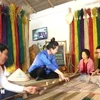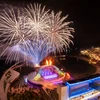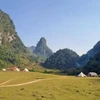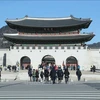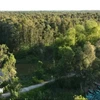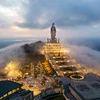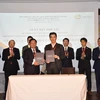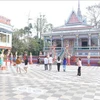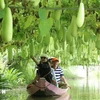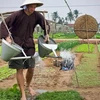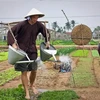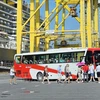A tour programme entitled “Memories of Old Battlefield and Comrades” has recorded some encouraging initial results after five years of operation, with increasing numbers of domestic and foreign tourists visiting the host province of Quang Tri.
According to Director of the provincial Department of Culture, Sports and Tourism Nguyen Huu Thang, the programme has contributed remarkably to the provinces economic development by creating jobs and reducing poverty.
From 2005 to June 2010, Quang Tri province welcomed nearly 3.7 million visitors, earning a total revenue of 2.77 billion VND - a modest figure but an encouraging sign for the tourist industry in a poor area like Quang Tri.
Quang Tri saw some of the fiercest battles during the war against the US , and is home to 431 historical sites.
Thang said that soon after the programme was launched in 2005, the province organised a series of socio-cultural activities and events to promote tourism.
Many cultural festivals focusing on the revolution have impressed not only local visitors but also foreigners from all over the world, including the annual Truong Son Legends Festival on July 27 and a ceremony to release flowers on Thach Han River.
The 2010 National Reunification Festival, which took place on the 35th anniversary of the liberation of the South and national reunification (April 30), has left a deep impression on nearly 100,000 visitors.
The “War Memoirs and Aspirations for Peace” Festival welcomed 38 foreign ambassadors and hundreds of overseas Vietnamese from all corners of the world.
This was a “double” efficiency of the combination of war relics and revolutionary festivals in areas that had seen fierce struggles during the war.
The province has also invested in the infrastructure that serves memorial tours, including historical sites and relics, and roads from Cua Tung beach to the Vinh Moc tunnels and roads to Cua Viet and Cua Tung beaches, Cua Tung Bridge and the memorial house to late Party General Secretary Le Duan.
Monuments to the heroes of Con Co Island and Regiment No. 27 in Cam Tuyen, a bell-tower in Quang Tri Citadel, road No. 9 and Truong Son Cemetery have been constructed or upgraded.
Tourist agencies in Quang Tri in particular have also responded to the programme by introducing reasonable and attractive tours as well as preparing maps, leaflets and publications that promote Vietnamese tourism.
Deputy Minister of Culture, Sports and Tourism Le Tien Tho stressed that in the future, businesses should define their markets in order to create more attractive tours.
He said that local tour operators need to liaise with travel agencies from the surrounding provinces and cities that have a large demands for visits to Quang Tri and then expand to localities along the East-West Corridor and countries in the Mekong sub-region, targeting overseas Vietnamese and academics who want to study the wars and revolutionary movements in Vietnam, especially in Quang Tri.
They should also look towards Western European countries, the Republic of Korea , Japan and the US and focus on war veterans and relatives of those who had fought in Quang Tri province.
As one of the initiators of the “Memories of Old Battlefield and Comrades” programme, Deputy Minister of National Defence Senior Lieutenant General Nguyen Huy Hieu said that the programme should be expanded to north-western, central and Central Highlands provinces, Ho Chi Minh City and Mekong Delta provinces.
Hieu, who fought on Quang Tri’s battlefields during the war, said he hoped that the programme will link up Quang Tri with other battlefields such as Dien Bien Phu in the north and Cu Chi tunnels in the south./.
According to Director of the provincial Department of Culture, Sports and Tourism Nguyen Huu Thang, the programme has contributed remarkably to the provinces economic development by creating jobs and reducing poverty.
From 2005 to June 2010, Quang Tri province welcomed nearly 3.7 million visitors, earning a total revenue of 2.77 billion VND - a modest figure but an encouraging sign for the tourist industry in a poor area like Quang Tri.
Quang Tri saw some of the fiercest battles during the war against the US , and is home to 431 historical sites.
Thang said that soon after the programme was launched in 2005, the province organised a series of socio-cultural activities and events to promote tourism.
Many cultural festivals focusing on the revolution have impressed not only local visitors but also foreigners from all over the world, including the annual Truong Son Legends Festival on July 27 and a ceremony to release flowers on Thach Han River.
The 2010 National Reunification Festival, which took place on the 35th anniversary of the liberation of the South and national reunification (April 30), has left a deep impression on nearly 100,000 visitors.
The “War Memoirs and Aspirations for Peace” Festival welcomed 38 foreign ambassadors and hundreds of overseas Vietnamese from all corners of the world.
This was a “double” efficiency of the combination of war relics and revolutionary festivals in areas that had seen fierce struggles during the war.
The province has also invested in the infrastructure that serves memorial tours, including historical sites and relics, and roads from Cua Tung beach to the Vinh Moc tunnels and roads to Cua Viet and Cua Tung beaches, Cua Tung Bridge and the memorial house to late Party General Secretary Le Duan.
Monuments to the heroes of Con Co Island and Regiment No. 27 in Cam Tuyen, a bell-tower in Quang Tri Citadel, road No. 9 and Truong Son Cemetery have been constructed or upgraded.
Tourist agencies in Quang Tri in particular have also responded to the programme by introducing reasonable and attractive tours as well as preparing maps, leaflets and publications that promote Vietnamese tourism.
Deputy Minister of Culture, Sports and Tourism Le Tien Tho stressed that in the future, businesses should define their markets in order to create more attractive tours.
He said that local tour operators need to liaise with travel agencies from the surrounding provinces and cities that have a large demands for visits to Quang Tri and then expand to localities along the East-West Corridor and countries in the Mekong sub-region, targeting overseas Vietnamese and academics who want to study the wars and revolutionary movements in Vietnam, especially in Quang Tri.
They should also look towards Western European countries, the Republic of Korea , Japan and the US and focus on war veterans and relatives of those who had fought in Quang Tri province.
As one of the initiators of the “Memories of Old Battlefield and Comrades” programme, Deputy Minister of National Defence Senior Lieutenant General Nguyen Huy Hieu said that the programme should be expanded to north-western, central and Central Highlands provinces, Ho Chi Minh City and Mekong Delta provinces.
Hieu, who fought on Quang Tri’s battlefields during the war, said he hoped that the programme will link up Quang Tri with other battlefields such as Dien Bien Phu in the north and Cu Chi tunnels in the south./.

